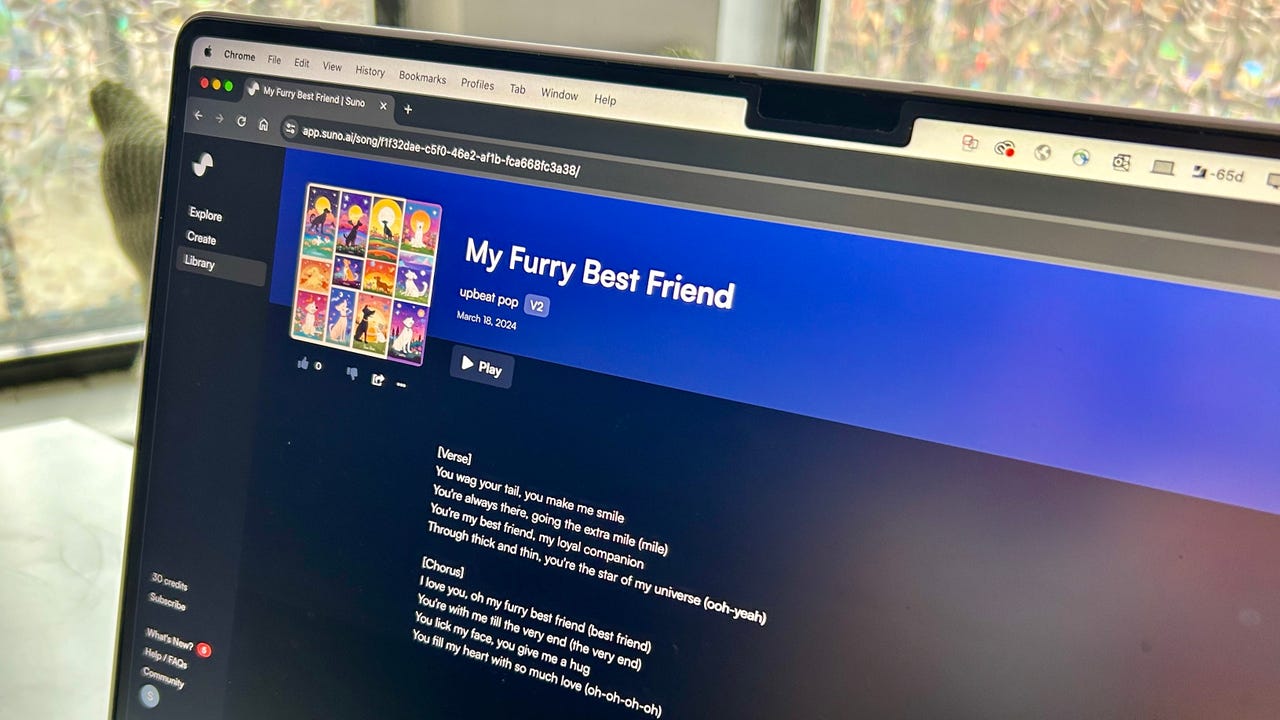
































Several text-to-music generators are now on the market, including offerings from Meta and Google. However, the Suno AI music generator is becoming increasingly popular -- likely because it creates original lyrics and vocals, and because it leverages the power of ChatGPT.
So, what is Suno and how does it work?
Also: YouTube creators will now have to label certain AI-generated videos upon upload
Suno is an AI music generator that generates a song with original lyrics and beats from a text prompt. The tool can be accessed via its free standalone website or via Microsoft Copilot by enabling Suno's third-party plug-in.
What makes Suno stand out from other music-generating models? In addition to creating the music, which you can do with Meta's AudioCraft and Google's MusicFX, Suno also produces original lyrics and vocals. This is a reflection of the company's mission to help everyone create music, regardless of background or musical knowledge.
Also: How AI helped get my music on all the major streaming services
"Whether you're a shower singer or a charting artist, we break barriers between you and the song you dream of making," Suno says on its website. Suno's intuitive interface makes it easy to use, and the only requirement is you need to create a free account.
In Rolling Stone's deep dive into Suno and its potential impact on the music business, the AI startup explained that Suno uses its own AI models to generate the music and then relies on ChatGPT to create the song's title and lyrics.
If you have ever used ChatGPT, you know it's capable of generating great text outputs, such as essays, thanks to its advanced natural language processing. The fact that Suno uses ChatGPT should tell you all you need to know about its text quality output.
Once you've created an account, you can start generating music by visiting app.suno.ai and entering a prompt into the textbox that describes the sound you want to hear and the topic you want the lyrics to be about.
Some examples offered by Suno include, "A groovy dance song about not being able to wait to see you again" and "A syncopated raga song about dancing all night long." Within seconds, Suno will create the song with lyrics, music, and a beat.
I entered the prompt, "A pop song with lyrics about how much you love your dog," and was met with two 37-second versions, including lyrics and album art, as seen at the top of this article.
You can find the lyrics to the first version below:
[Verse]
You wag your tail, you make me smile
You're always there, going the extra mile (mile)
You're my best friend, my loyal companion
Through thick and thin, you're the star of my universe (ooh-yeah)
[Chorus]
I love you, oh my furry best friend (best friend)
You're with me till the very end (the very end)
You lick my face, you give me a hug
You fill my heart with so much love (oh-oh-oh-oh)
Although the clips are short, you can extend them by clicking on the three dots and clicking "Continue from the song." Here you have the option to add your own lyrics and style of music, or randomize both.
Also: AI has created areas so grey, you could write a song about it
Suno users get 50 credits per day for free. A single song generation costs 10 credits. If you need more credits, you can upgrade to the Pro Plan for$8 per month, which gives you 2,500 credits per month; or the Premier Plan, which gives you access to 10,000 credits per month.
Both subscription plans have other perks, such as general commercial terms, optional credit top-ups, access to a priority generating queue, and the ability to run 10 jobs at once. If you want to use Suno in Copilot, you can find 's step-by-step instructions here.
The emergence of AI music generators has alarmed music labels and artists because of how easy it is to create music that uses artists' voices without their consent. How is Suno navigating this copyright issue?
According to the Rolling Stone report, Suno refuses to generate any music in the style of real artists' voices.
Since all the music generated is original and not lifted from other artists' work, paying subscribers own the songs generated by Suno, as well as the artwork that accompanies the songs. However, Suno retains all ownership of songs created by free users, as well as the artwork.
Also: The best AI chatbots of 2024: ChatGPT and alternatives
As a result, if you are a paying subscriber, you can use the music you generate for commercial use, including posting the songs on YouTube, Spotify, or Apple Music. Free users can only post on social media with attribution and are not allowed to use the songs commercially. Regardless of which version you use, if you input your own lyrics, you retain ownership of those.
Are the songs subject to copyright protection? Here's what Suno says on its website:
"The availability and scope of copyright protection for content generated (in whole or in part) using artificial intelligence is a complex and dynamic area of law, which is rapidly evolving and varies among countries. We encourage you to consult a qualified attorney to advise you about the latest development and the degree of copyright protection available for the output you generate using Suno."
Also: A thorny question: Who owns code, images, and narratives generated by AI?
As AI becomes more pervasive in the music industry, we will continue to see policy developments that try to delineate what you can and can't legally use AI to do. For example, over the summer, the Recording Academy addressed when and how AI-generated music and content would be considered for the Grammy Awards.
 Горячие метки:
Искусственный интеллект
3. Инновации
Горячие метки:
Искусственный интеллект
3. Инновации